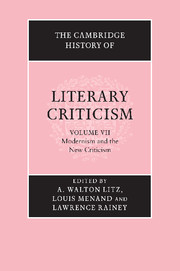Book contents
- Frontmatter
- Introduction
- THE MODERNISTS
- THE NEW CRITICS
- THE CRITIC AND THE INSTITUTIONS OF CULTURE
- 14 Criticism and the academy
- 15 The critic and society, 1900–1950
- 16 The British ‘Man of Letters’ and the rise of the professional
- 17 F. R. Leavis
- 18 Lionel Trilling
- 19 Poet-critics
- 20 Criticism of Fiction
- Bibliography
- Index
- References
14 - Criticism and the academy
from THE CRITIC AND THE INSTITUTIONS OF CULTURE
Published online by Cambridge University Press: 28 March 2008
- Frontmatter
- Introduction
- THE MODERNISTS
- THE NEW CRITICS
- THE CRITIC AND THE INSTITUTIONS OF CULTURE
- 14 Criticism and the academy
- 15 The critic and society, 1900–1950
- 16 The British ‘Man of Letters’ and the rise of the professional
- 17 F. R. Leavis
- 18 Lionel Trilling
- 19 Poet-critics
- 20 Criticism of Fiction
- Bibliography
- Index
- References
Summary
In concluding his History of Criticism (1900–4), Saintsbury remarked that ‘the personnel of Criticism’ had been ‘enlarged, improved, strengthened in a most remarkable degree’ during the preceding fifty years. Citing Sainte-Beuve and Matthew Arnold as the most distinguished practitioners of ‘this New Criticism’, he looked forward to its dissemination and to the ‘possible institution of a new Priesthood of Literature, disinterested, teaching the world really to read, enabling it to understand and enjoy’ (III, pp. 606–7). As Saintsbury all but says, that priesthood could only be the professoriate. During the next fifty years, ‘criticism, once the province of nonacademic journalists and men of letters, became (with exceptions) virtually the monopoly of university departments’ (Graff, Professing Literature, p. 14).
At the beginning of the century, the distinction between men of letters and professors was not so sharp as to prevent movement from one occupation to the other. Later, universities served as occasional havens for writers and poets who also happened to be critics. In these cases, the academy was simply a site for the production of criticism that might incidentally reflect the circumstances of its creation. There was a more integral relation between the site and the activity in the criticism of those who spent their entire careers in universities, but within this encompassing category, discriminations are necessary. Some were also poets whose critical interests were related to their creative practice (Richards, Empson, Blackmur, and Winters, for example). Scholar-critics (A. C. Bradley, C. S. Lewis) constitute another category, and scholar-theorists (René Wellek, R. S. Crane, W. K. Wimsatt) a third. And a few made signal contributions as editors – such as Leavis and Ransom, who, in Scrutiny and The Kenyon Review, brought together the practical criticism that is the most noteworthy innovation of academic criticism in the first half of the century.
- Type
- Chapter
- Information
- The Cambridge History of Literary Criticism , pp. 267 - 321Publisher: Cambridge University PressPrint publication year: 2000
References
- 6
- Cited by



